Research & Reviews : A Journal of Biotechnology
Editorial Board
Biography
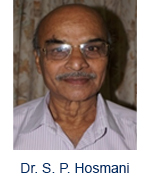 |
Dr. Shankar.P. Hosmani obtained his Ph.D. Degree from Karnataka University, Dharwad in 1976. After completing the CSIR Post-Doctoral work he joined the University of Mysore during 1979. During his tenure of 30 years of teaching Post-Graduate students, he has taught various branches of Botany, Microbiology and Environmental Science. He has successfully guided 23 students towards Ph.D. programs in Botany and Environmental Science. He has many contributory articles in renowned books and has more than 90 research publications in national and International journals with high citation index of h10. Presently he is Professor and Head of the Department of Biotechnology and is involved in teaching Tissue culture, Cell Biology, Immunology, Medical Biotechnology, Environmental Biotechnology and Bioinformatics. He is presently guiding five students Ph.D. Degree and is a recognized guide from PRIST University, Vallam, Thanjuvar. He is also the Convener of the Research Cell. |
|---|
 |
Saber Mohamed Abd-Allah is Associate Professor in the Theriogenology Department of Faculty of Veterinary Medicine at the University of Beni-Suef University, Egypt.He received his Ph.D. Degree in Theriogenology from Cairo University in 2003 and earned his postdoctoral Fellowship from Institute of Shanghai Institute of Biochemistry and Cell Biology of Chinese Academy of Sciences then worked as Associate professor in Faculty of Veterinary Medicine, Beni-Suef University for Five Years. He is having Sixteen Years of Experience in the field of Animal Biology and Biotechnology. His Area of Expertise includes: Animal Biology, Reproductive Sciences, Theriogenology, Stem Cell Cultures, Stem cell Differentiation, Neural Development, In Vitro Fertilization, Embryo Cryopreservation and Embryo Transfer.He is the author of 35 Published papers in International Journals and Edited Five Book. In addition to his publications, Dr. Saber Abd-Allah is a well popular speaker at national & international scientific & professional meetings. He was awarded a CV RAMAN International Fellowship for African Researchers in 2012. He is the Founder and Chairman of Reproductive Biology and Genetics Society (RBGS), IACSIT, Singapore and also involved in Over Hundred International Associations and Societies. |
|---|
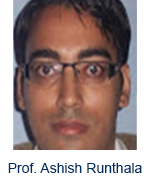 |
Prof. Ashish Runthala is a Professor in the Department of Biological Sciences at the Birla Institute of Technology and Science University.He earned his postdoctoral M.E. Biotechnology from the same university in 2008. He is having 6.5 years of Experience in the field of Bioinformatics. Area of Expertise includes: Protein Structure, Bioinformatics and Evolutionary Biology.He is the author of 10 papers, 4 Chapters and 7 conference publications. |
|---|
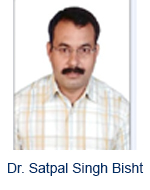 |
Dr. Satpal Singh Bisht is an inspiring Professor and Researcher in the field of Life Sciences since 20 years. Dr. Satpal Singh Bisht, is an internationally acclaimed Biologist / academician and an Administrator. He Completed his Doctoral Degree in the year 1992 from Kumaun University, Nainital Uttarakhand, India .He has published many research papers and articles in the journals of international repute i.e. Biology Fertility of Soils, Applied Soil Ecology, Pedobiologia, European Journal of Soil Biology, Tropical Ecology and many others journals, Visited many countries on academic assignments. Dr. Bisht is a member of various academic bodies of many Universities & Colleges, editor & reviewer of many journals, nominated and received many professional awards from many academic organizations. Dr. Bisht presently is working as Professor & Head at the P.G. Department of Biotechnology, Roland Institute of Pharmaceutical Sciences, Berhampur India. |
|---|
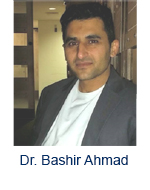 |
Dr. Ahmad is an enthusiastic young researcher and educator based in UK at the University of Cambridge, recently. During his post-doctoral fellowship within the Cambridge Analytical Biotechnology Research Cluster, he is investigating to design a cost effective nanosensor to detect the quantity of nanoparticles in human body fluids. He is on sabbatical from the International Islamic University, Islamabad where he is serving as an assistant professor of Biotechnology since 2010. During his stay at IIUI, Dr. Ahmad has earned many honors performing as a dedicated teacher, researcher and faculty advisor to the Human Rights Forum (HRF), a designated body under the Iqbal Institute of Research and Dialogue at IIUI. Bashir invested his five years (2005-2010) to earn a degree of Ph.D. in Microbiology. Working in the area of applied microbiology, he screened the extremophilic bacteria from glaciers in the north of Pakistan and characterized the activity of alkaline phosphatase with the collaborative research at the University of Waterloo, Canada. The bacterial isolates he studied, its methodology, their non-purified and purified metabolites all were commercial commodities. This approach provided him vision and skills to become a biotech entrepreneur. Through Biotech Enterprises he established at IIUI, they are actively involved in value addition of research-based materials and their transfer to the community. Currently, this enterprise is running the cause of establishing biogas plants at various domestic settings using the cultured bacteria meant for enhanced production of biomethane at a lower temperature. |
|---|
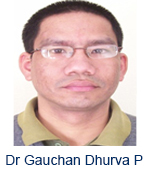 |
Dr Gauchan Dhurva P is an Associate Professor in the Department of Biotechnology School of Science at the University of Kathmandu University, Dhulkhel, Kavre, Nepal, He received his Ph.D. degree in Biotechnology from M.D.S. University Ajmer, India in 2004. He/she is having Nine years of teaching experience in the field of Biotechnology. Her/his Area of Expertise includes: Plant Tissue Culture Technology, Population Genetics of Higher Plants. He is the author of 22 research papers and 1 book published and attended many national and international conferences and workshop. |
|---|
 |
Dr. M. V. Rajam is Professor of Genetics at the University of Delhi South Campus, New Delhi and has over three decades of research experience in the fields of plant biotechnology and polyamine physiology, and recently RNAi applications in plants, and published over 130 papers, including book chapters/reviews. He is a Co-editor of a two volume book on “Plant Biology and Biotechnology”, published by Springer in 2015. Dr. Rajam received his M. Sc (1979) and Ph. D (1983) degrees from Kakatiya University, Warangal, Telangana, and had a postdoctoral research experience at Yale University, New Heaven, and Boyce Thompson Institute, Cornell University, Ithaca, USA (1984-1985). He is a Fellow of The Indian National Science Academy, National Academy of Sciences, India, Indian Academy of Agricultural Sciences and Telanga State Academy of Sciences, and member of several learned scientific societies. He serves as a member of editorial board and Associate Editor of some important international journals and RNAi technology task force committee of DBT, and a reviewer for many international and national journals. He has also received several honors and awards. |
|---|
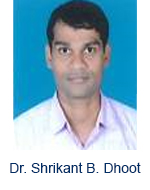 |
Dr. Shrikant B. Dhoot is currently working with India top industry in the area of renewable resources and products for petrochemicals and pharmaceutical. He received his Ph.D. Degree in Bioprocess Technology from UDCT, Mumbai University in 2006 and then worked as a Research Associate in Shell for 3 Years. He is having 9 Years of Experience in the field of alternative energy/biofuels. His Area of Expertise includes: renewable energy, biofuels, algae, biomass to fuels, biodiesel. He has 6 publications to his credit with 4 patent applications. |
|---|
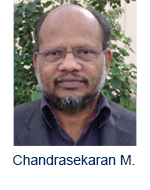 |
Prof. M. Chandrasekaran is a distinguished scientist and a Teacher who has made significant contributions in the field of marine microbiology and biotechnology. Born on April 10th 1956 he had his B.Sc Degree in Zoology from University of Madras, India, M.Sc degree in Marine biology from Annamalai University, India and Ph.D degree in Microbiology from Cochin University of Science and Technology, India, He did his post doctoral research in genetic engineering of bacteria for waste water treatment in Hiroshima University, Japan. His major areas of research interest are harnessing marine microorganisms for novel enzymes and bioactive molecules. He started his career as Lecturer in the Department of Applied Chemistry in the Cochin University of Science and Technology in 1983 and later in 1991 as Founder Head organized the Department of Biotechnology in Cochin University of Science and Technology, India and served in the same department as Professor of biotechnology till 22-1-2009. Currently he is serving as a Professor in the Department of Botany and Microbiology, College of Science, King Saud University, Riyadh, Saudi Arabia since 31-1-2009. |
|---|
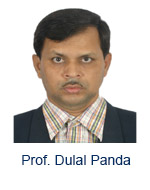 |
Prof. Dulal Panda did his Ph. D. in Biochemistry from Bose Institute, Kolkata in 1994. After that he pursued his scientific career as a post-doc fellow at the Department of Molecular, Cellular and Developmental Biology, University of California Santa Barbara, CA, USA, and then as Assistant Research Biologist at University of California Santa Barbara. He joined School of Biosciences & Bioengineering, IIT Bombay as Assistant Professor in 2000 and currently is the Chair Professor of the Department. His areas of research interest include Eukaryotic and prokaryotic cell divisions, assembly dynamics of microtubules and FtsZ, microtubule targeted anticancer agents, and FtsZ-targeted antibacterial drugs. He has filed 4 patent applications on cancer drugs and one patent on antibacterial drug. He has been the recipient of many honors and awards. Notable among them are the DAE-SRC Outstanding Researcher Award (2010), CDRI Award for Excellence in Drug Research (2010), S. C. Bhattacharyya award excellence in basic sciences, IIT Bombay 2010, P.S. Sarma Memorial Award (2007) from the Society of Biological Chemists, India, National Bioscience Award from the Department of Biotechnology, Government of India (2005) and Fogarty International Research Award, National Institute of Health, USA (2001). So far Prof. Panda has authored nearly 100 publications in peer reviewed international journals. |
|---|

